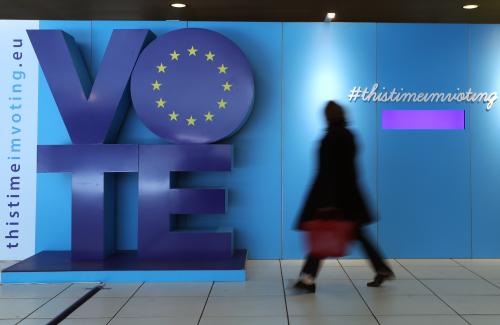The vision for Europe’s future has become increasingly contested and uncertain due to Brexit, the rise of populist parties, and a United States that is often more critical than cooperative. On June 13, Brookings’s Center on the United States and Europe (CUSE) held two panels to explore the future of Europe and the trans-Atlantic relationship, as part of the Brookings-Robert Bosch Foundation Transatlantic Initiative. CUSE Director Thomas Wright and Senior Vice President of International Relations America and Asia at Robert Bosch Stiftung Christian Hänel provided opening remarks.
The first panel—with Célia Belin, visiting fellow at CUSE; Yascha Mounk, senior fellow at the SNF Agora Institute; Alina Polyakova, director of Brookings’s Project on Global Democracy and Emerging Technology and CUSE fellow; Amanda Sloat, Robert Bosch Senior Fellow at CUSE; and Financial Times Columnist and Commentator Edward Luce as moderator—asked whether Europe’s center can hold. The experts first interpreted the results of the recent European Parliament elections, noting that there is significant fragmentation among mainstream parties (especially the center left) and that populist parties are here to stay, even though they only comprise around a third of the parliament. Second, the discussants reflected on the future of Brexit by examining key issues underlying Britain’s failure to exit the European Union (EU), and what Britain’s departure could look like under different Conservative leaders. Finally, they debated what European leaders should do going forward, such as forging a consensus behind EU reforms and being more prescriptive in their relationship with the United States.
The second panel—with Walter Russell Mead, Ravenel B. Curry Distinguished Fellow in Strategy and Statesmanship at the Hudson Institute; Victoria Nuland, nonresident senior fellow at CUSE; Constanze Stelzenmüller, Robert Bosch Senior Fellow at CUSE; Benjamin Haddad, director of the Future Europe Initiative at the Atlantic Council; and Thomas Wright as moderator—centered on the trans-Atlantic agenda in 2021. Broadly, the experts agreed that the U.S.-Europe relationship should not be based on nostalgia and how things used to be. Instead, it should be grounded on the mutual understanding that although the two blocs’ interests have changed (e.g. Obama’s pivot to Asia, the EU increasing its defense capabilities, divergence over the Iran nuclear deal), trans-Atlantic cooperation is still crucial in the pursuit of common interests, such as deterring Russian and Chinese aggression. Subsequently, the panelists discussed how the U.S. should perceive and respond to developments in Europe, and vice versa.
Both panels also took questions from the audience.
Brookings Intern Naz Gocek contributed to this post.





Commentary
Is Europe headed toward a post-American future?
Experts discuss
July 8, 2019